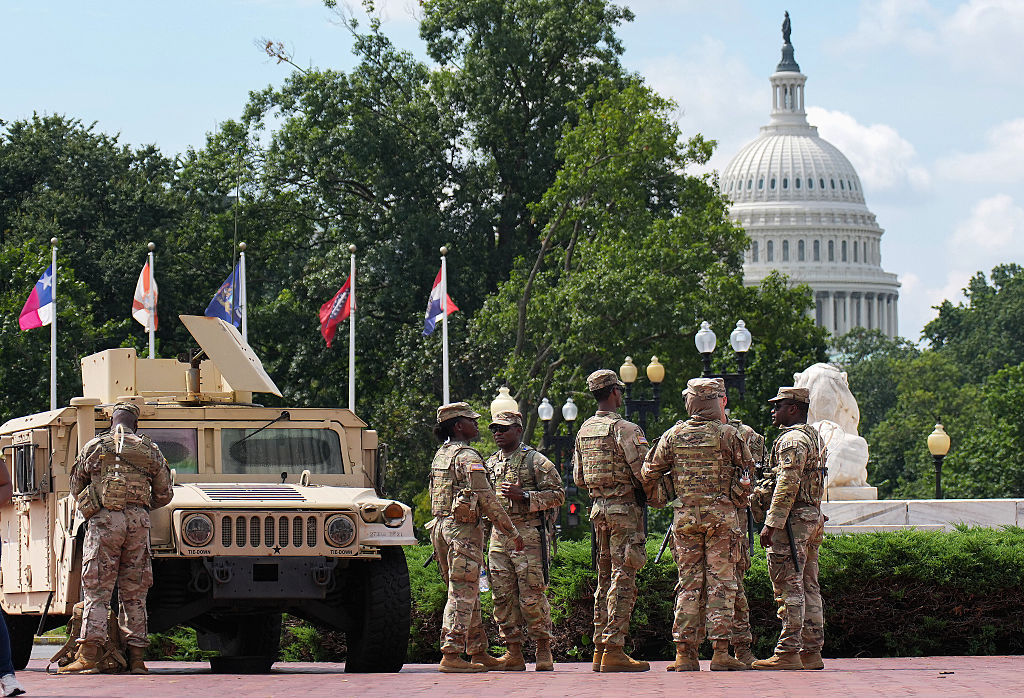President Donald Trump’s 30-day takeover of Washington D.C.’s police force is set to expire Wednesday night, but the federal crackdown on the city isn’t over yet.
Trump declared a state of emergency over crime in the nation’s capital one month ago, invoking a section of the District of Columbia Home Rule Act of 1973 to take control over the local police force. The law, which gives D.C. residents a greater degree of self-governance but retains Congress’s constitutional authority over the city, only enabled Trump to federalize the D.C. police for up to 30 days. After that point, Congress would need to extend the White House’s emergency control—and House Speaker Mike Johnson has said lawmakers don’t currently have plans to do so.
[time-brightcove not-tgx=”true”]
“No one’s calling on Congress yet,” Johnson said during a press conference on Tuesday, citing D.C. Mayor Muriel Bowser’s ongoing cooperation and what he characterized as her “indefinite welcome mat” for the National Guard.
In an order last week, Bowser called for ongoing collaboration between local and federal law enforcement “to the maximum extent allowable by law within the District.” The directive does not have an expiration date.
“If you have an agreement, my understanding is an agreement between the White House and the local leadership, then I’m not sure Congress has any necessity to do anything,” Johnson said. “So we’ll see how that plays out.”
With Trump’s takeover expiring, Metropolitan Police Department (MPD) chief Pamela Smith is set to assume full control over the department on Thursday.
While Congress isn’t taking action to extend the President’s emergency declaration, however, the House Committee on Oversight and Government Reform was set to meet on Wednesday to discuss a series of bills that would increase federal control over D.C. Among the legislation being proposed is a bill that aims to codify parts of an Executive Order Trump issued earlier this year, including by establishing a “D.C. Safe and Beautiful Commission to coordinate across federal agencies and D.C., Maryland, and Virginia, and to develop joint priorities to enable the full enforcement of Federal and local laws within the District,” according to a press release from the Oversight Committee.
Other proposals include lowering the age of juveniles who can be prosecuted as adults from 16 to 14 and allowing the president to appoint the city’s attorney general.
Despite Trump’s control over the MPD ending, the Army has instructed the National Guard—which Trump deployed on the streets of the capital when he declared the state of emergency—to remain in D.C. through the end of November.
“Our mission is not complete,” said Brig. Gen. Leland D. Blanchard II, who oversees the Guard in D.C., in a social media post. “I’ve made the decision to extend the encampment as we continue to ensure that everyone who walks through these city streets is safe.”
The order only applies to the D.C. National Guard. It does not apply to the Guard members from other states who have also been deployed in the city; their next moves will be determined by their states’ governors.
D.C. sued the Administration last week over its deployment of over 2,000 federal troops in the city, describing their presence as a “military occupation.”
“Deploying the National Guard to engage in law enforcement is not only unnecessary and unwanted, but it is also dangerous and harmful to the District and its residents,” said D.C. Attorney General Brian Schwalb.
A federal judge earlier ruled that Trump’s deployment of the Guard in Los Angeles in response to anti-immigration protests was illegal due to troops’ use in civil law-enforcement functions.
“The violations were not one-off acts by individual servicemembers but were rather the function of systematic and willful orders to troops to execute domestic law,” Judge Charles R. Breyer of the Federal District Court in San Francisco, saying the troops’ use suggested an effort to create a “national police force.”
Since deploying federal forces in Los Angeles and D.C. this summer, Trump has threatened a number of other cities with potential crackdowns over crime and immigration. Trump indicated last month that Chicago was next in his sights, prompting the city to prepare for the presence of federal troops in recent weeks. The Department of Homeland Security announced an immigration enforcement campaign in the city on Monday called Operation Midway Blitz, as well as launching a similar operation in Massachusetts over the weekend. However the full-scale crackdown on crime in Chicago that Trump has suggested has not yet materialized.
Crime in D.C. and Chicago, as in many other American cities, climbed during the COVID-19 pandemic but has been on a marked decline in the last couple years.

